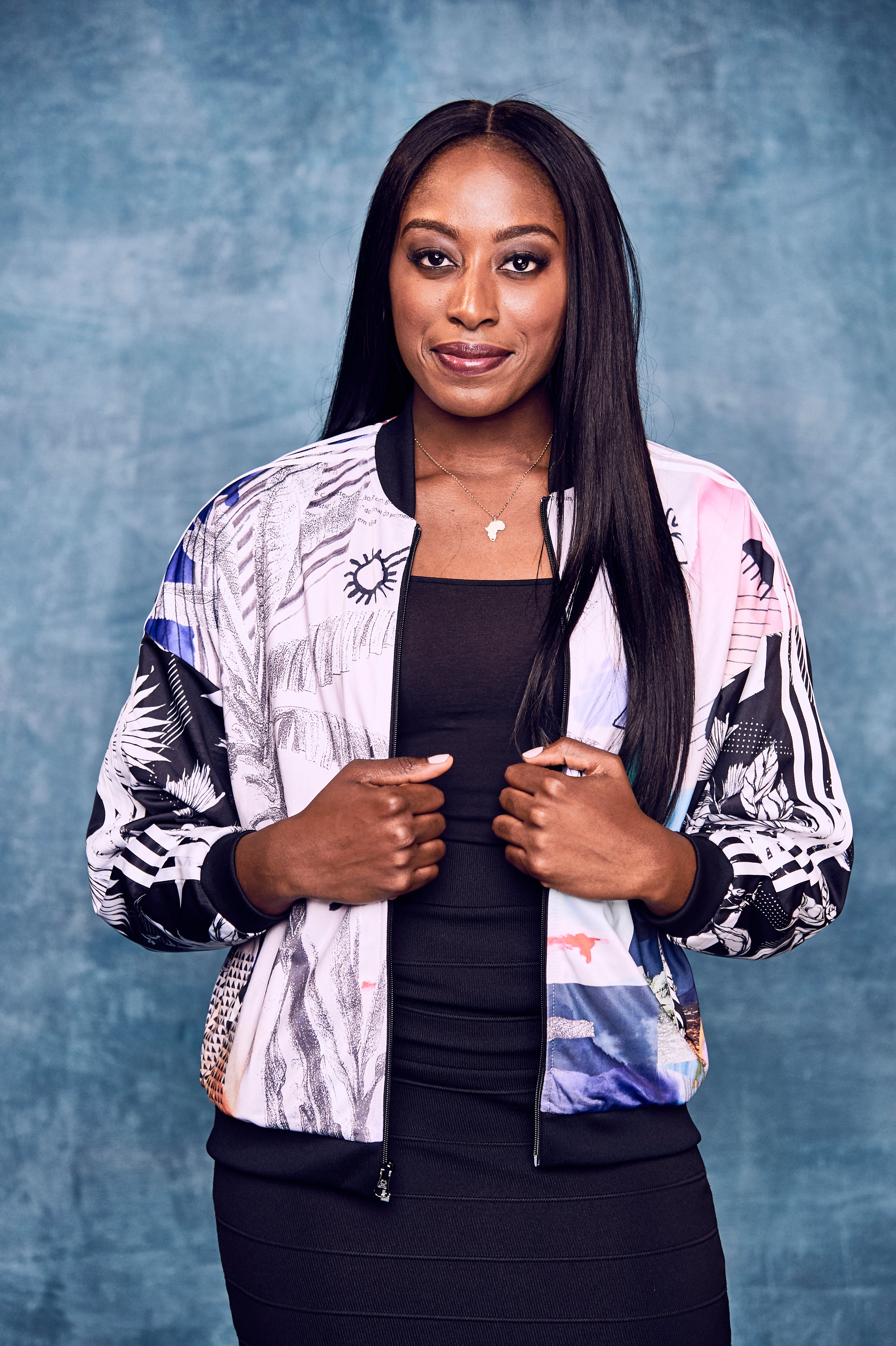
Chiney Ogwumike is no stranger to being a groundbreaker.
The Stanford University alum was the first woman picked in the 2014 WNBA draft, she was the 2014 WNBA Rookie of the Year, and after recently signing a multi-year contract with ESPN to become a full-time in-studio analyst, Ogwumike is one of the youngest people — and few women of color — to assume such a role. While many will, rightfully, marvel at the 26-year-old’s achievements, she says she had a good role model.
“My big sis was a trailblazer herself. She was the first one in my family to be selected number one, and she’s been the WNBA MVP, so she set the bar incredibly high,” Ogwumike says of her older sister, Los Angeles Sparks star Nneka Ogwumike.
Many would find it tough to follow such an accomplished older sibling, but Ogwumike is blazing her own trail. “As female athletes, we are inherently powerful women. And one thing that we have that is very unique is we’re very proud to use our voice, whether it’s in our community or trying to advocate for our game. I’ve found opportunities to use my voice, and share my voice, and also have fun talking hoops.”
Though she never expected to be an on-air analyst, after being sidelined by an injury, the Connecticut Sun star turned a setback into a new career opportunity.
“I’ve had two major injuries in my career. As an athlete, I’ve always been a competitor so I wasn’t going to let these injuries hold me back,” she tells ESSENCE. “As I was rehabbing and coming back from these injuries, I got a great opportunity with ESPN.”
While recovering from the first injury, Ogwumike filled in on His and Hers, which featured Michael Smith and Jemele Hill at the time, and First Take. “I prepared as much as I could and I just jumped in,” she says of her successful runs on the popular shows. When she got injured again a year later, Ogwumike reached out to the network for a second time and they allowed her to serve as a analyst for about a dozen women’s college basketball games.
The partnership worked. And when ESPN launched SportsCenter Africa in 2017, the Nigerian-American star seemed like the perfect fit to host the show.
Though she may not have predicted she’d end up analyzing basketball for the premiere sports network in the country, Ogwumike loves it.
“As a young, female, Nigerian-American, who talks basketball and is very into girls empowerment, I work for SportsCenter Africa and I’m an NBA analyst–these are all part of my identity that I’m really passionate about. So I’m really blessed to do what I love,” she says.
But just because Ogwumike loves her work, doesn’t mean it’s easy. “It’s been a grind,” she admits. In addition to the 34-game WNBA season each the summer, Ogwumike is in the ESPN studios at 6 a.m. three to four days a week. After that, she hits the gym four days a week to lift weights and then heads the hardwood to train for basketball.
The pace can be daunting. “It’s a full day, but I get everything done,” she says.
The WNBA star’s drive is impressive, but her workload is a lot different than her male counterparts in the NBA who have longer seasons, more vacation time, and earn far more money.
“The WNBA is technically my part-time job. I will be working (as an analyst) for most of the NBA season,” Ogwumike says. “In the NBA they can’t do this because they’re hooping for most of the year. WNBA players play from May to September. So when people say, ‘How are you going to be a full time WNBA player and a full time NBA analyst?’ Well, technically those things only overlap for one month.”
While she’s grateful to be able to pursue both opportunities, Ogwumike, who is also Vice President of the WNBA’s player association, knows that the odds are stacked against female basketball players.
“The WNBA is at a really crucial moment. At the end of this season, we are going to go into our [collective bargaining agreement] negotiations when we’re going to try to create a better position for the current WNBA players financially,” she says.
“Everyone knows we don’t get paid as much as the men, granted we only play one-third of the NBA season. But the reality is, WNBA players are underpaid, which means your number one option as a player is to go and play overseas where they pay two to three times more than what we make in the WNBA,” she explains.
Though many women would prefer to stay in America and play basketball, the reality is it’s not always financially feasible. That’s another reason Ogwumike is excited about her expanded role with ESPN.







“ESPN is stepping up to the plate to show that young, female voices matter and they’re able to support my career so that I don’t have to feel obligated to go elsewhere to play,” Ogwumike says, noting she’s played in Italy and China, and her sister, Nneka, has played in Russia, China, and Poland. “I want to show women, especially my peers, that we can do something else. We don’t have to play 24/7. Men get about a four-month break, women are playing 24/7. Once their WNBA season ends, they go straight to another country,” which often leaves them prone to injuries,” she says.
Ogwumike’s increased on-air presence comes at a time when some female commentators, like Jemele Hill, have come under fire and even faced racist jabs. But the basketball star isn’t worried.
“I don’t feel any pressure because being young, female, African, and being there is already a win,” she says. “People may be quicker to judge when you’re not what they expect, but I’m really excited to prove people wrong.”







